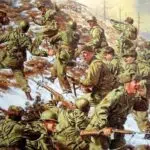National Borinqueneers Day is commemorated annually on April 13. Borinqueneers are also known as the “65th Infantry Regiment.” This day recognizes their contributions to the “U.S. Armed Forces” as well as highlights their representation of Hispanic soldiers and veterans. It’s a time to remember the Puerto Rican soldiers who not only bravely fought on the battlefield to defend the freedom of every American but fought discrimination among their fellow soldiers as well. The Borinqueneers were symbols of hope for people willing to make sacrifices for a better future, even as they searched for acceptance and equality. As long as the memory of their valor is honored, their sacrifices will not be vain and their legacy will live on for generations of Puerto Ricans to be proud of.
History of National Borinqueneers Day
Dating back to 1899, the 65th “Infantry Regiment” was intended only for service on the island of Puerto Rico. They were regarded as unsuitable for combat and overseas deployment.
This racism kept them from serving in combat as they were simply regarded as untrustworthy in battle because of their culture. It was only until the Korean War that the “U.S. Army” decided to use them as first-line combat troops from 1950 to 1953 as part of the 3rd Infantry Division. Also known as the ‘el sesenta y cinco de infanteria’ and its men as the ‘Borinqueneers,’ it was made up solely of Puerto Rican soldiers. The name ‘Borinqueneers’ is both a Spanish and English translation of ‘Boriken,’ the Arawak or Taino indigenous name for Puerto Rico. The three first syllables are read in Spanish and the last one is in English.
Despite the signing of Executive Order 9981 by President Harry Truman in 1948 which paved the way for the desegregation of the armed forces, the 65th Infantry remained a segregated Puerto Rican unit. These soldiers suffered ethnic prejudice such as not being allowed to speak Spanish, cutting off their rations of rice and beans, as well as being ordered to shave off their mustaches. For Puerto Rican males, this was degrading as mustaches symbolized manhood. In the face of these hardships, the Borinqueneers fought relentless North Korean and Chinese soldiers in fierce combat. They continued to serve with distinction in key battles, continuing to pay the price in both lives and dignity until it was deactivated on April 10, 1956.
National Borinqueneers Day timeline
The 65th Infantry officially becomes part of the “U.S. Army” and is known as the Porto Rican Regiment.
The U.S. conducts a military exercise where the aggressor ground forces are made up of the 65th Infantry, which mounts a successful defense against an American force of 16,000 liberators with air and water support.
Many of the 65th Infantry refuse to fight due to poor leadership, which leads to the mass arrest, trial, and sentencing of 91 soldiers from 23 November – to 26 December 1952.
President Barack Obama signs the bill awarding the 65th Infantry the Congressional Gold Medal on June 10.
National Borinqueneers Day FAQs
How many Puerto Ricans served in the Korean War?
Over 61,000 served in the U.S. Armed Forces, many with the 65th Infantry.
What awards did the Borinqueneers receive?
Aside from the Congressional Medal of Honor, they had earned 10 Distinguished Service Crosses, 256 Silver Stars, over 600 Bronze Stars, and 3,000 Purple Hearts.
How many Puerto Rican soldiers died in the Korean War?
They suffered 3,540 casualties and 747 were killed, while 122 are listed as missing in action.
How to Observe National Borinqueneers Day
Drink rum and cokes
The 65th infantry was called the ‘Rum and Coca-Cola’ outfit as a jest during their early years. Dedicate a toast — or two— to this cocktail for the bravery shown by these men on and off the battlefield.
Savor a plate of Puerto Rican Rice and Beans
Rice and beans were the Borinqueneers’ special rations. Order the hearty dish or learn to make it at home so you can enjoy its comforting flavors anytime.
Grow a mustache
If you’re a man, consider this as day one and start growing this symbol of manhood. If you’re a woman, encourage the men in your life to grow one in honor of the 65th Infantry’s memory.
5 Stars Of The 65th Infantry Regiment
Major General Juan César Cordero Dávila
During the Korean War, he was appointed commanding officer of the 65th “Infantry Regiment” and rose to become one of the highest-ranking ethnic officers in the “U.S. Army.”
Lieutenant Colonel Teófilo Marxuach
He ordered the first hostile shots fired in World War I on behalf of the U.S. on a German supply ship trying to escape San Juan Bay.
Colonel Carlos Betances Ramirez
He holds the distinction of being the only Puerto Rican officer to lead an infantry battalion in the Korean War.
Master Sergeant Pedro Rodriguez
He was awarded two Silver Stars in one week for operations he carried out on March 24 and March 31, 1951.
Colonel Antulio Segarra
He was the first Puerto Rican Regular Army officer to command a regular army regiment.
Why National Borinqueneers Day is Important
It honors a group from a U.S. territory
Despite not being part of the mainland, the Puerto Rican soldiers showed their dedication to the cause of the U.S.
It makes a significant deal about a minority
It’s not every day that the military services of a minority group get recognized. It shows gratitude towards their brave actions.
It inspires both Puerto Ricans and non-Puerto Ricans alike
Learning about the soldiers’ experiences can help motivate others to live a life of honor and service, no matter what nationality they are.
National Borinqueneers Day dates
| Year | Date | Day |
|---|---|---|
| 2026 | April 13 | Monday |
| 2027 | April 13 | Tuesday |
| 2028 | April 13 | Thursday |
| 2029 | April 13 | Friday |
| 2030 | April 13 | Saturday |

















